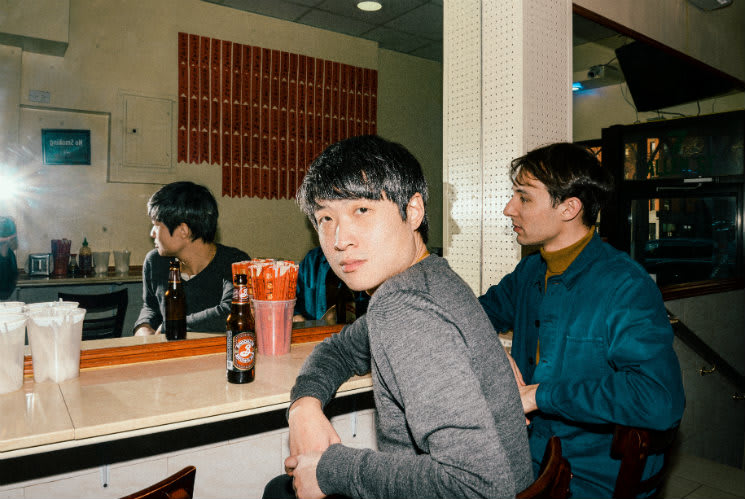After an apologetic preamble about VPNs and time zone differences, Gong Gong Gong bassist Joshua Frank brushes away any half-baked "made in China" narratives Western media might want to apply to his Beijing-based art-punk duo's new album, Phantom Rhythm 幽靈節奏, when he accidentally sets off his American iPhone, Siri interrupts the Skype interview, and he can't not address it.
"So, we're under surveillance everywhere," Frank jests with Exclaim!.
Rather than making music about overbearing governments ("I don't really think about that that much," guitarist/vocalist Tom Ng confirms), Frank insists Gong Gong Gong's preoccupations are more familiar than Western audiences might anticipate.
"China in general is just changing and growing so quickly — it feels like everywhere is constantly under construction and regulations are always changing, so everything kind of feels a bit temporary or hard to keep permanent," Frank comments. "I think that, in many ways, that's a problem everywhere around the world."
True. It's also a perspective he and Ng have come by earnestly gigging as Gong Gong Gong and in their respective previous bands, recently touring either side of the Atlantic opening for Parquet Courts, Bodega and Flasher through last fall and winter around the release of their first seven-inch, Siren 追逐劇.
Full of references to cable car views, horse rides, Mustangs rolling down city streets and late-night scooter narratives, that sense of accelerated modernist propulsion is all over their debut full-length, even if their audiences don't typically understand the lyrics.
Ng sings exclusively in Cantonese, but mainland China audiences speak Mandarin. Indeed, Gong Gong Gong's Beijing locality is a bit misleading; Ng was born in Hong Kong, where Cantonese is the native dialect, and Frank was born in Montreal — and their music is a scorched minimalist concoction of New York no wave, West African blues, Cantonese opera and even funk. At the same time, Ng points out that Cantopop music from Hong Kong enjoyed popularity amongst Chinese audiences in the '80s and '90s, so Gong Gong Gong "kind of reminds people of those sounds that they used to listen to when they were younger."
It's a novel, front-facing quality that leaves a lasting impression, but it also has its limitations.
"The problem of writing songs in Cantonese is that you can't really alter the tone of each character that you speak," Ng explains. "I can't really write a complete sentence in Cantonese into a song that also worked with the melody."
Through navigating his language's boundaries, he's adopted an experimental lyrical approach of free association and imagistic pastiche that lets the listeners fill in the blanks.
Album single "Some Kind of Demon 某一種惡魔" slams Cantonese words into each other in reflective conjunctions, their English translations reading like a stuttering series of abandoned ideas, while "Sound of Love 愛歌" filters images and feelings through an engine blast.
When Phantom Rhythm 幽靈節奏 arrives via Brooklyn label Wharf Cat Records on Friday (October 4) with Chinese lyrics and English translations, it will be the first time audiences that have been lost in translation through most of the band's career will be able to understand their songs (Cantonese and Mandarin share similar characters), but the band's ability to gather a fanbase speaks to an uncanny ability to write songs that resonate on a deeper, trans-lingual level.
Inspired by a New Year's Eve in Tokyo, "Wei Wei Wei 喂喂喂" concerns Ng and a friend encountering a Japanese woman being harassed in an alleyway, but most of the action is swapped out for the Japanese word "wei."
"It's what you would say if you were gonna shout to get someone's attention," Frank explains.
"It's also like what a lot of drunk Japanese guys would yell," adds Ng.
But to the English listener, it sounds like Ng's narrator is questioning the decisions and effectiveness of the different characters he embodies in the song. And when the band played the track at a recent show in Shanghai, the audience anticipated parts despite never having heard the song, as if possessed by some dormant energy underlying the instrumentation.
"At the point where Tom would grunt, he didn't during this live set, and it felt like maybe 20 people in the audience — it was audible —responded with the part, basically like they were singing along or grunting along in a way that Gong Gong Gong can make them," Frank recounts. "That's one of the more gratifying aspects of performing live because you're realizing that what you're doing — without actually having percussion — is having this undeniable effect on the people listening to it in a way that makes them want to move, but without drums. That's pretty unusual."
That kind of magic is all over Phantom Rhythm 幽靈節奏. Borrowed from a bandmate in Ng's previous project Offset:Spectacles, the title concept provides at once a thematic overview of the record and an accurate description of Frank and Ng's playing dynamic.
"It was Tom's bandmate who I guess kind of coined the term 'phantom rhythm'; the idea that through the interplay of different instruments, you kind of create the effect of percussion," Frank explains.
While Offset:Spectacles charted a Velvet Underground-like path with organ, viola, bass and Ng's percussive guitar play, with Gong Gong Gong, Ng's guitar pounds out jagged minimalist landscapes. Meanwhile, Frank's droning bass conjures ghostly melodic elements through careful adherence to simple harmonics, and the combination of those duelling elements propels the listener through the resulting image, Ng's percussive strumming techniques even more pronounced in the sparser mix.
That's taken to another level on lead single "Notes Underground 地下日記," which was born out of an attempt to mimic the rhythm section of Bo Diddley's "My Dearest Darling" and finds the pair fixing a contact mic to the wood of Ng's archtop guitar for a tone somewhere between a Brazilian berimbau and a mattress spring, while Frank wrote "Sound of Love 愛歌" as an approximation of Canned Heat.
But more than any identifiable influence, Phantom Rhythm is ultimately defined by a restless spirit: drifting between New Year's Eves in Tokyo and galloping across fields, materializing on cable car rides over the Yangtze in Chongqing while words struggle to convey meaning.
From whatever angle you approach their music, it's clear Gong Gong Gong are generating sounds and occupying spaces that are simultaneously placeless and universal. With Phantom Rhythm 幽靈節奏, they've unlocked a secret sonic geography of a blurry periphery, and here, the possibilities feel limitless.
"So, we're under surveillance everywhere," Frank jests with Exclaim!.
Rather than making music about overbearing governments ("I don't really think about that that much," guitarist/vocalist Tom Ng confirms), Frank insists Gong Gong Gong's preoccupations are more familiar than Western audiences might anticipate.
"China in general is just changing and growing so quickly — it feels like everywhere is constantly under construction and regulations are always changing, so everything kind of feels a bit temporary or hard to keep permanent," Frank comments. "I think that, in many ways, that's a problem everywhere around the world."
True. It's also a perspective he and Ng have come by earnestly gigging as Gong Gong Gong and in their respective previous bands, recently touring either side of the Atlantic opening for Parquet Courts, Bodega and Flasher through last fall and winter around the release of their first seven-inch, Siren 追逐劇.
Full of references to cable car views, horse rides, Mustangs rolling down city streets and late-night scooter narratives, that sense of accelerated modernist propulsion is all over their debut full-length, even if their audiences don't typically understand the lyrics.
Ng sings exclusively in Cantonese, but mainland China audiences speak Mandarin. Indeed, Gong Gong Gong's Beijing locality is a bit misleading; Ng was born in Hong Kong, where Cantonese is the native dialect, and Frank was born in Montreal — and their music is a scorched minimalist concoction of New York no wave, West African blues, Cantonese opera and even funk. At the same time, Ng points out that Cantopop music from Hong Kong enjoyed popularity amongst Chinese audiences in the '80s and '90s, so Gong Gong Gong "kind of reminds people of those sounds that they used to listen to when they were younger."
It's a novel, front-facing quality that leaves a lasting impression, but it also has its limitations.
"The problem of writing songs in Cantonese is that you can't really alter the tone of each character that you speak," Ng explains. "I can't really write a complete sentence in Cantonese into a song that also worked with the melody."
Through navigating his language's boundaries, he's adopted an experimental lyrical approach of free association and imagistic pastiche that lets the listeners fill in the blanks.
Album single "Some Kind of Demon 某一種惡魔" slams Cantonese words into each other in reflective conjunctions, their English translations reading like a stuttering series of abandoned ideas, while "Sound of Love 愛歌" filters images and feelings through an engine blast.
When Phantom Rhythm 幽靈節奏 arrives via Brooklyn label Wharf Cat Records on Friday (October 4) with Chinese lyrics and English translations, it will be the first time audiences that have been lost in translation through most of the band's career will be able to understand their songs (Cantonese and Mandarin share similar characters), but the band's ability to gather a fanbase speaks to an uncanny ability to write songs that resonate on a deeper, trans-lingual level.
Inspired by a New Year's Eve in Tokyo, "Wei Wei Wei 喂喂喂" concerns Ng and a friend encountering a Japanese woman being harassed in an alleyway, but most of the action is swapped out for the Japanese word "wei."
"It's what you would say if you were gonna shout to get someone's attention," Frank explains.
"It's also like what a lot of drunk Japanese guys would yell," adds Ng.
But to the English listener, it sounds like Ng's narrator is questioning the decisions and effectiveness of the different characters he embodies in the song. And when the band played the track at a recent show in Shanghai, the audience anticipated parts despite never having heard the song, as if possessed by some dormant energy underlying the instrumentation.
"At the point where Tom would grunt, he didn't during this live set, and it felt like maybe 20 people in the audience — it was audible —responded with the part, basically like they were singing along or grunting along in a way that Gong Gong Gong can make them," Frank recounts. "That's one of the more gratifying aspects of performing live because you're realizing that what you're doing — without actually having percussion — is having this undeniable effect on the people listening to it in a way that makes them want to move, but without drums. That's pretty unusual."
That kind of magic is all over Phantom Rhythm 幽靈節奏. Borrowed from a bandmate in Ng's previous project Offset:Spectacles, the title concept provides at once a thematic overview of the record and an accurate description of Frank and Ng's playing dynamic.
"It was Tom's bandmate who I guess kind of coined the term 'phantom rhythm'; the idea that through the interplay of different instruments, you kind of create the effect of percussion," Frank explains.
While Offset:Spectacles charted a Velvet Underground-like path with organ, viola, bass and Ng's percussive guitar play, with Gong Gong Gong, Ng's guitar pounds out jagged minimalist landscapes. Meanwhile, Frank's droning bass conjures ghostly melodic elements through careful adherence to simple harmonics, and the combination of those duelling elements propels the listener through the resulting image, Ng's percussive strumming techniques even more pronounced in the sparser mix.
That's taken to another level on lead single "Notes Underground 地下日記," which was born out of an attempt to mimic the rhythm section of Bo Diddley's "My Dearest Darling" and finds the pair fixing a contact mic to the wood of Ng's archtop guitar for a tone somewhere between a Brazilian berimbau and a mattress spring, while Frank wrote "Sound of Love 愛歌" as an approximation of Canned Heat.
But more than any identifiable influence, Phantom Rhythm is ultimately defined by a restless spirit: drifting between New Year's Eves in Tokyo and galloping across fields, materializing on cable car rides over the Yangtze in Chongqing while words struggle to convey meaning.
From whatever angle you approach their music, it's clear Gong Gong Gong are generating sounds and occupying spaces that are simultaneously placeless and universal. With Phantom Rhythm 幽靈節奏, they've unlocked a secret sonic geography of a blurry periphery, and here, the possibilities feel limitless.




